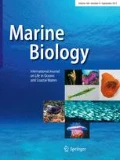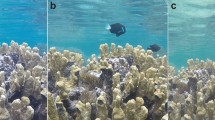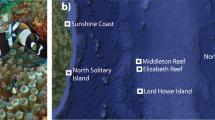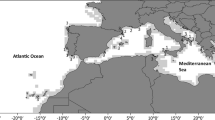Abstract
The anemone–anemonefish mutualism is one of the most iconic marine mutualisms. For decades, anemonefishes have been known to protect anemones from predators, while anemones provide safe havens for anemonefishes. More recently, it has been suggested that the number of anemonefish influences the survival, growth, and asexual reproduction of anemones. Here, we build on those findings, investigating the effect of four variables (fish number, fish biomass, fish shyness, and anemone colony area), on anemone growth and asexual reproduction. The interaction between Amphiprion percula and Entacmaea quadricolor was used as a tractable system in a controlled aquarium setting. Fish and anemones were monitored in 60 tanks for 18 months, and we recorded all variables at 6-month intervals. We performed single-measure analyses and found that fish shyness, defined as the time spent in the vicinity of the anemone, significantly predicts anemone growth over the entire experiment. Further, we performed repeated-measure analyses and found that both fish shyness and initial anemone colony area significantly predict anemone growth per time period. These data suggest that behavioral variation among individual fish may be an important driver of anemone growth. More generally, this study highlights the importance of behavioral traits in mediating the strength of interspecific interactions such as mutualisms and suggests that such effects should be accounted for when investigating the dynamics of interacting populations.



Similar content being viewed by others
References
Allen GR (1972) The Anemonefishes: their classification and biology, 2nd edn. TFH Publications, Neptune City
Arnold TW (2010) Uninformative parameters and model selection using Akaike’s Information Criterion. J Wildl Manag 74:1175–1178. doi:10.1111/j.1937-2817.2010.tb01236.x
Arvedlund M, Takemura A (2005) Long-term observation in situ of the anemonefish Amphiprion clarkii (Bennett) in association with a soft coral. Coral Reefs 24:698. doi:10.1007/s00338-005-0007-3
Bascompte J (2009) Mutualistic networks. Front Ecol Environ 7:429–436. doi:10.1890/080026
Bascompte J, Jordano P (2007) Plant-animal mutualistic networks: the architecture of biodiversity. Annu Rev Ecol Evol Syst 38:567–593. doi:10.1146/annurev.ecolsys.38.091206.095818
Bascompte J, Jordano P (2013) Mutualistic networks. Princeton University Press, Princeton. doi:10.1515/9781400848720
Bermudes M, Glencross B, Austen K, Hawkins W (2010) The effects of temperature and size on the growth, energy budget and waste outputs of barramundi (Lates calcarifer). Aquaculture 306:160–166. doi:10.1016/j.aquaculture.2010.05.031
Bolnick DI, Svanback R, Fordyce JA, Yang LH, Davis JM, Hulsey CD, Forister ML (2003) The ecology of individuals: incidence and implications of individual specialization. Am Nat 161:1–28. doi:10.1086/343878
Bolnick DI, Amarasekare P, Araujo MS, Burger R, Levine JM, Novak M, Rudolf VHW, Schreiber SJ, Urban MC, Vasseur DA (2011) Why intraspecific trait variation matter in community ecology. Trends Ecol Evol 26:183–192. doi:10.1016/j.tree.2011.01.009
Bronstein JL (2009) Mutualism and symbiosis. In: Levin SA (ed) The Princeton guide to ecology. Princeton University Press, pp 233–238. doi:10.1515/9781400833023.233
Brooks WR, Mariscal RN (1984) The acclimation of anemone fishes to sea anemones: protection by changes in the fish’s mucous coat. J Exp Mar Biol Ecol 81:277–285. doi:10.1016/0022-0981(84)90155-2
Buston PM (2002) Group structure of the clown anemonefish Amphiprion percula. Dissertation, Cornell University
Buston PM (2003a) Forcible eviction and prevention of recruitment in the clown anemonefish. Behav Ecol 14:576–582. doi:10.1093/beheco/arg036
Buston PM (2003b) Mortality is associated with social rank in the clown anemonefish. Mar Biol 143:811–815. doi:10.1007/s00227-003-1106-8
Buston PM (2003c) Social hierarchies: size and growth modification in clownfish. Nature 424:145–146. doi:10.1038/424145a
Buston P (2004) Does the presence of non-breeders enhance the fitness of breeders? An experimental analysis in the clown anemonefish Amphiprion percula. Behav Ecol Sociobiol 57:23–31. doi:10.1007/s00265-004-0833-2
Buston PM, Elith J (2011) Determinants of reproductive success in dominant pairs of clownfish: a boosted regression tree analysis. J Anim Ecol 80:528–538. doi:10.1111/j.1365-2656.2011.01803.x
Chadwick NE, Arvedlund M (2005) Abundance of giant sea anemones and patterns of association with anemonefish in the northern Red Sea. J Mar Biol Assoc UK 85:1287–1292. doi:10.1017/s0025315405012440
Chamberlain SA, Bronstein JL, Rudgers JA (2014) How context dependent are species interactions? Ecol Lett 17:881–890. doi:10.1111/ele.12279
Chase TJ, Pratchett MS, Walker SPW, Hoogenboom MO (2014) Small-scale environmental variation influences whether coral-dwelling fish promote or impede coral growth. Oecologia. doi:10.1007/s00442-014-3065-9
Cleveland A, Verde EA, Lee RW (2011) Nutritional exchange in a tropical tripartite symbiosis: direct evidence for the transfer of nutrients from anemonefish to host anemone and zooxanthellae. Mar Biol 158:589–602. doi:10.1007/s00227-010-1583-5
Conrad JL, Weinersmith KL, Brodin T, Saltz JB, Sih A (2011) Behavioural syndromes in fishes: a review with implications for ecology and fisheries management. J Fish Biol 78:395–435. doi:10.1111/j.1095-8649.2010.02874.x
Darwin CD (1859) On the origin of species by means of natural selection, or the preservation of favored races in the struggle for life. John Murray, London
Dixon AK, Needham D, Al-Horani FA, Chadwick NE (2014) Microhabitat use and photoacclimation in the clownfish sea anemone Entacmaea quadricolor. J Mar Biol Assoc UK 94(3):473–480. doi:10.1017/s0025315413001719
Fautin DG (1986) Why do anemonefishes inhabit only some host actinians? Environ Biol Fishes 15(3):171–180. doi:10.1007/bf00002992
Fautin DG (1991) The anemonefish symbiosis: what is known and what is not. Symbiosis 10:23–46
Fautin DG, Allen GR (1997) Anemone fishes and their host sea anemones. Western Australian Museum, Perth
Fitt WK, Cook CB (2001) The effects of feeding or addition of dissolved inorganic nutrients in maintaining the symbiosis between dinoflagellates and a tropical marine cnidarian. Mar Biol 139:507–517. doi:10.1007/s002270100598
Frisch AJ, Rizzari JR, Munkres KP, Hobbs JPA (2016) Anemonefish depletion reduces survival, growth, reproduction and fishery productivity of mutualistic anemone–anemonefish colonies. Coral Reefs 35:375–386. doi:10.1007/s00338-016-1401-8
Godwin J, Fautin DG (1992) Defense of host actinians by anemonefishes. Copeia 3:902–908. doi:10.2307/1446171
Goldshmid R, Holzman R, Weihs D, Genin A (2004) Aeration of corals by sleep-swimming fish. Limnol Oceanogr 49(5):1832–1839. doi:10.4319/lo.2004.49.5.1832
Holbrook SJ, Schmitt RJ (2005) Growth, reproduction and survival of a tropical sea anemone (Actiniaria): benefits of hosting anemonefish. Coral Reefs 24:67–73. doi:10.1007/s00338-004-0432-8
Holbrook SJ, Brooks AJ, Schmitt RJ, Stewart HL (2008) Effects of sheltering fish on growth of their host corals. Mar Biol 155:521–530. doi:10.1007/s00227-008-1051-7
Huebner LK, Dailey B, Titus BM, Khalaf M, Chadwick NE (2012) Host preference and habitat segregation among Red Sea anemonefish: effects of sea anemone traits and fish life stages. Mar Ecol Prog Ser 464:1–15. doi:10.3354/meps09964
Johnson MA, Leal M, Schettino LR, Lara AC, Revell LJ, Losos JB (2008) A phylogenetic perspective on foraging mode evolution and habitat use in West Indian Anolis lizards. Anim Behav 75:555–563. doi:10.1016/j.anbehav.2007.06.012
Liberman T, Genin A, Loya Y (1995) Effects on growth and reproduction of the coral Stylophora pistillata by the mutualistic damselfish Dascyllus marginatus. Mar Biol 121:741–746. doi:10.1007/bf00349310
Lomnicki A (1988) Population ecology of individuals. Princeton University Press, Princeton
Mariscal RN (1970a) An experimental analysis of the protection of Amphiprion xanthurus Cuvier and Valenciennes and some other anemone fishes from sea anemones. J Exp Mar Biol Ecol 4:134–149. doi:10.1016/0022-0981(70)90020-1
Mariscal RN (1970b) The nature of the symbiosis between Indo-Pacific anemone fishes and sea anemones. Mar Biol 6:58–65. doi:10.1007/bf00352608
Mebs D (1994) Anemonefish symbiosis: vulnerability and resistance of fish to the toxin of the sea anemone. Toxicon 32(9):1059–1068. doi:10.1016/0041-0101(94)90390-5
Medve RJ (1978) Mycorrhiza: a common form of mutualism. Am Biol Teach 40:414–418. doi:10.2307/4446322
Mitchell JS, Dill M (2005) Why is group size correlated with the size of the host sea anemone in the false clown anemonefish? Can J Zool 83:372–376. doi:10.1139/z05-014
Nelson JS, Chou LM, Phang VPE (1994) Pigmentation variation in the anemonefish Amphiprion ocellaris (Teleostei: Pomacentridae): type, stability and its usefulness for individual identification. Raffles Bull Zool 42:927–930
Ollerton J, McCollin D, Fautin DG, Allen GR (2007) Finding NEMO: nestedness engendered by mutualistic organization in anemonefish and their hosts. Proc R Soc B 274:591–598. doi:10.1098/rspb.2006.3758
Planes S, Jones GP, Thorrold SR (2009) Larval dispersal connects fish populations in a network of marine protected areas. Proc Natl Acad Sci USA 106:5693–5697. doi:10.1073/pnas.0808007106
Porat D, Chadwick-Furman NE (2004) Effects of anemonefish on giant sea anemones: expansion behavior, growth, and survival. Hydrobiologia 530(531):513–520. doi:10.1007/s10750-004-2688-y
Porat D, Chadwick-Furman NE (2005) Effects of anemonefish on giant sea anemones: ammonium uptake, zooxanthella content and tissue regeneration. Mar Freshw Behav Physiol 38:43–51. doi:10.1080/10236240500057929
Pruitt JN, Ferrari MCO (2011) Intraspecific trait variants determine the nature of interspecific interactions in a habitat-forming species. Ecology 92:1902–1908. doi:10.1890/11-0701.1
Pruitt JN, Krauel JJ (2010) The adaptive value of gluttony: predators mediate the life history trade-offs of satiation threshold. J Evol Biol 23:2104–2111. doi:10.1111/j.1420-9101.2010.02070.x
R Core Team (2016) R: a language and environment for statistical computing. R Foundation for Statistical Computing, Vienna. https://www.R-project.org/
Reale D, Reader SM, Sol D, McDougall PT, Dingemanse NJ (2007) Integrating animal temperament within ecology and evolution. Biol Rev 82:291–318. doi:10.1111/j.1469-185x.2007.00010.x
Rezende EL, Lavabre JE, Guimaraes PR Jr, Jordano P, Bascompte J (2007) Non-random coextinctions in phylogenetically structured mutualistic networks. Nature 448:925–928. doi:10.1038/nature05956
Riechert SE (1991) Prey abundance vs. diet breadth in a spider test system. Evol Ecol 5:327–338. doi:10.1007/bf02214236
Roopin M, Chadwick NE (2009) Benefits to host sea anemones from ammonia contributions of resident anemonefish. J Exp Mar Biol Ecol 370:27–34. doi:10.1016/j.jembe.2008.11.006
Roopin M, Henry RP, Chadwick NE (2008) Nutrient transfer in a marine mutualism: patterns of ammonia excretion by anemonefish and uptake by giant sea anemones. Mar Biol 154:547–556. doi:10.1007/s00227-008-0948-5
Roopin M, Thornhill DJ, Santos SR, Chadwick NE (2011) Ammonia flux, physiological parameters, and Symbiodinium diversity in the anemonefish symbiosis on Red Sea coral reefs. Symbiosis 53:63–74. doi:10.1007/s13199-011-0110-x
Schmitt RJ, Holbrook SJ (2003) Mutualism can mediate competition and promote coexistence. Ecol Lett 6:898–902. doi:10.1046/j.1461-0248.2003.00514.x
Sebens KP (1980) The regulation of asexual reproduction and intermediate body size in the sea anemone Anthopleura elegantissima (Brandt). Biol Bull 158:370–382. doi:10.2307/1540863
Sebens KP (1982) Asexual reproduction in Anthopleura Elegantissima (Anthozoa: Actiniaria): seasonality and spatial extent of clones. Ecology 63:434–444. doi:10.2307/1938961
Sih A, Bell A, Johnson JC (2004) Behavioral syndromes: an ecological and evolutionary overview. Trends Ecol Evol 19:372–378. doi:10.1016/j.tree.2004.04.009
Stier AC, Gil MA, McKeon CS, Lemer S, Leray M, Mills SC, Osenberg CW (2012) Housekeeping mutualisms: do more symbionts facilitate host performance? PLoS ONE 7(4):e32079. doi:10.1371/journal.pone.0032079
Szczebak JT, Henry RT, Al-Horani FA, Chadwick NE (2013) Anemonefish oxygenate their anemone hosts at night. J Exp Biol 216:970–976. doi:10.1242/jeb.075648
Verde EA, Cleveland A, Lee RW (2015) Nutritional exchange in a tropical tripartite symbiosis II: direct evidence for the transfer of nutrients from host anemone and zooxanthellae to anemonefish. Mar Biol 162:2409–2429. doi:10.1007/s00227-015-2768-8
Weber NA (1966) Fungus-growing ants. Science 153:587–604. doi:10.1126/science.153.3736.587
Wong MYL, Medina A, Uppaluri C, Arnold S, Seymour JR, Buston PM (2013) Brief communication: consistent behavioural traits and behavioural syndromes in pairs of the false clown anemonefish Amphiprion ocellaris. J Fish Biol 83:207–213. doi:10.1111/jfb.12133
Acknowledgements
This research was made possible by the Undergraduate Research Opportunities Program at Boston University and a start-up grant awarded to Peter Buston from the Trustees of Boston University. We thank John Majoris and Tina Barbasch for helpful feedback. In addition, we would like to thank Jeremiah Seymour, Alissa Rickborn, Arianna Medina, Diana Acosta, Derek Scolaro, Athbah Almuhairi, Cara Martone, Linda Wong, Jarrod Moore, and Andrew Lacqua for helping with various aspects of this project in the laboratory.
Author information
Authors and Affiliations
Corresponding author
Ethics declarations
Conflict of interest
The authors declare that they have no conflict of interest.
Ethical approval
All procedures performed in studies involving animals were in accordance with the ethical standards of the institution or practice at which the studies were conducted.
Additional information
Responsible Editor: D. Goulet.
Reviewed by N. E. Chadwick and undisclosed experts.
Rights and permissions
About this article
Cite this article
Schmiege, P.F.P., D’Aloia, C.C. & Buston, P.M. Anemonefish personalities influence the strength of mutualistic interactions with host sea anemones. Mar Biol 164, 24 (2017). https://doi.org/10.1007/s00227-016-3053-1
Received:
Accepted:
Published:
DOI: https://doi.org/10.1007/s00227-016-3053-1




